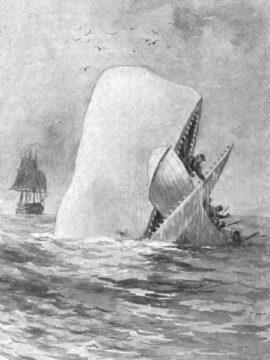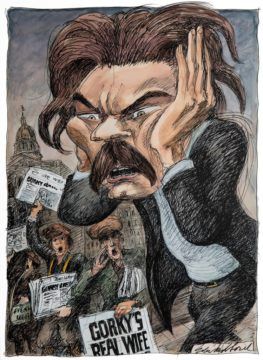“(The Birth of Guam)” (Poem)
Guam was born on March 6, 1521, when Ferdinand Magellan arrived in the womb of Humåtak Bay and delivered [us] into the calloused hands of modernity. “Guam is Where Western Imperialism in the Pacifc Begins!” St. Helena Augusta, tayuyute [ham] : pray for [us]. The annual reenactment of “Discovery Day” is a must see for all tourists: Chamorros-dressed-as-our- ancestors welcome Chamorros-dressed-as-the-galleon-crew. After the bloody performance, enjoy local food, walking tours, live reggae bands, and fireworks! Guam was adopted on December 10, 1898, when the Treaty of Paris was signed, and Spain ceded [us] to the United States. “Guam is Where America’s Western Frontier Begins!” Guam was declared an “unincorporated territory” on May 27, 1901, when the Supreme Court Insular Cases decided that the U.S. constitution does not follow its flag. “Guam is Where America’s Logic of Territorial Incorporation Ends!” Guam was kidnapped on December 8, 1941, when Japan bombed, invaded, and occupied [us]. “Guam is Where the Greater East Asia Co- Prosperity Sphere Begins!” On July 21, 1944, the U.S. armed forces returned and defeated the Japanese military. Guam was naturalized on August 1, 1950, when the Organic Act bestowed U.S. citizenship upon [us]. “Guam is Where America’s Passports Begin!” Guam was pimped out on May 1, 1967, when Pan American World Airways arrived with the first 109 Japanese tourists. The Guam Visitors Bureau birthed a new marketing slogan: “Guam is Where America’s Day Begins!” Since Guam is located 2,000 miles west of the international dateline, [we] instagram the sunrise before anyone in the fifty states. For the past 30 years, a straw poll on Guam has accurately predicted U.S. presidential elections, even though our votes don’t actually count in the electoral college. “Guam is Where America’s Voting Rights End!” This ironic streak ended in 2016, when Hillary Clinton received 70% of the ballots cast on Guam, yet Donald Trump still won #notmycolonizerinchief. St. Thomas More, tayuyute [ham]. After the election, [we] begin the countdown to Super Bowl Monday, a sacred day when all Chamorros leave work and school in procession to the altar of the television. St. Sebastian, tayuyute [ham]. I attended George Washington High School on Guam, but I often skipped “English” class because the haole teacher made [us] memorize boring, canonical verse. “Guam is Where America’s Poetry Begins!” Sorry not sorry if I threw everyone’s rhyme and meter off.

 On 7 March 1965, the nation came to grips with one of the most iconic images synonymous with the fight for voting rights and equality.
On 7 March 1965, the nation came to grips with one of the most iconic images synonymous with the fight for voting rights and equality.  For the mathematician Sarah Hart, a close reading of “Moby-Dick” reveals not merely (per D.H. Lawrence) “one of the strangest and most wonderful books in the world” and “the greatest book of the sea ever written,” but also a work awash in mathematical metaphors. “Herman Melville, he really liked mathematics — you can see it in his books,” said Dr. Hart, a professor at Birkbeck, University of London, during a February talk on “
For the mathematician Sarah Hart, a close reading of “Moby-Dick” reveals not merely (per D.H. Lawrence) “one of the strangest and most wonderful books in the world” and “the greatest book of the sea ever written,” but also a work awash in mathematical metaphors. “Herman Melville, he really liked mathematics — you can see it in his books,” said Dr. Hart, a professor at Birkbeck, University of London, during a February talk on “ A lost poem by
A lost poem by  Efficacy is a crucial concept in vaccine trials, but it’s also a tricky one. If a vaccine has an efficacy of, say, 95 percent, that doesn’t mean that 5 percent of people who receive that vaccine will get Covid-19. And just because one vaccine ends up with a higher efficacy estimate than another in trials doesn’t necessarily mean it’s superior. Here’s why.
Efficacy is a crucial concept in vaccine trials, but it’s also a tricky one. If a vaccine has an efficacy of, say, 95 percent, that doesn’t mean that 5 percent of people who receive that vaccine will get Covid-19. And just because one vaccine ends up with a higher efficacy estimate than another in trials doesn’t necessarily mean it’s superior. Here’s why. More than two decades after the country democratized, a sense of insecurity persists in daily life in South Africa, and access to the public good of security has remained astonishingly unequal. In lieu of equitable access to security, affluent neighborhoods are adorned with nine-foot cement walls, expandable steel security gates, and armed guards. Even the state itself employs private security officers, hiring private guards to patrol the outside of police precincts and to carry out unseemly land evictions. Private security in South Africa is like a snake eating its own tail, as the government itself invests in the firms that are undermining its own authority.
More than two decades after the country democratized, a sense of insecurity persists in daily life in South Africa, and access to the public good of security has remained astonishingly unequal. In lieu of equitable access to security, affluent neighborhoods are adorned with nine-foot cement walls, expandable steel security gates, and armed guards. Even the state itself employs private security officers, hiring private guards to patrol the outside of police precincts and to carry out unseemly land evictions. Private security in South Africa is like a snake eating its own tail, as the government itself invests in the firms that are undermining its own authority. In 1966, a young American journalist named Frances FitzGerald began publishing articles from South Vietnam in leading magazines, including this one. She was the unlikeliest of war correspondents—born into immense privilege, a daughter of the high-WASP ascendancy. Her father, Desmond FitzGerald, was a top CIA official; her mother, Marietta Tree, a socialite and liberal activist. FitzGerald was raised with servants and horses, and she had to fend off advances from the likes of Adlai Stevenson (her mother’s lover) and Henry Kissinger. Her family contacts got her through the door of feature journalism in New York, but as a woman, she was denied the chance to pursue the serious work she wanted to do. She escaped this jeweled trap by making her own way to Saigon at age 25, just as the American war was escalating.
In 1966, a young American journalist named Frances FitzGerald began publishing articles from South Vietnam in leading magazines, including this one. She was the unlikeliest of war correspondents—born into immense privilege, a daughter of the high-WASP ascendancy. Her father, Desmond FitzGerald, was a top CIA official; her mother, Marietta Tree, a socialite and liberal activist. FitzGerald was raised with servants and horses, and she had to fend off advances from the likes of Adlai Stevenson (her mother’s lover) and Henry Kissinger. Her family contacts got her through the door of feature journalism in New York, but as a woman, she was denied the chance to pursue the serious work she wanted to do. She escaped this jeweled trap by making her own way to Saigon at age 25, just as the American war was escalating. Everyone seems to be talking about the problems with physics: Peter Woit’s book Not Even Wrong, Lee Smolin’s The Trouble With Physics, and Sabine Hossenfelder’s Lost in Math leap to mind, and they have started a wider conversation. But is all of physics really in trouble, or just some of it? If you actually read these books, you’ll see they’re about so-called “fundamental” physics. Some other parts of physics are doing just fine, and I want to tell you about one. It’s called “condensed matter physics,” and it’s the study of solids and liquids. We are living in the golden age of condensed matter physics.
Everyone seems to be talking about the problems with physics: Peter Woit’s book Not Even Wrong, Lee Smolin’s The Trouble With Physics, and Sabine Hossenfelder’s Lost in Math leap to mind, and they have started a wider conversation. But is all of physics really in trouble, or just some of it? If you actually read these books, you’ll see they’re about so-called “fundamental” physics. Some other parts of physics are doing just fine, and I want to tell you about one. It’s called “condensed matter physics,” and it’s the study of solids and liquids. We are living in the golden age of condensed matter physics. A mutating virus is destroying a world-view that has ruled governments, business and popular culture for a century or more. A model in which humankind was achieving ever higher levels of control over the planet has shaped much of modern thinking. Evolution has been understood as the ascent from primeval slime to unchallengeable human dominance over all other forms of life. Fundamentally at odds with the theory of natural selection, this was never more than pseudo-science. Yet from the late 19th century onwards it became a ruling paradigm, captivating generations of thinkers and inspiring world-changing political movements. Today the myth is crumbling. For the first time in history, using genomic sequencing, natural selection is being observed, in detail and real time, at the level of genes. Evolution is continuing, rapidly, with the virus as the chief protagonist.
A mutating virus is destroying a world-view that has ruled governments, business and popular culture for a century or more. A model in which humankind was achieving ever higher levels of control over the planet has shaped much of modern thinking. Evolution has been understood as the ascent from primeval slime to unchallengeable human dominance over all other forms of life. Fundamentally at odds with the theory of natural selection, this was never more than pseudo-science. Yet from the late 19th century onwards it became a ruling paradigm, captivating generations of thinkers and inspiring world-changing political movements. Today the myth is crumbling. For the first time in history, using genomic sequencing, natural selection is being observed, in detail and real time, at the level of genes. Evolution is continuing, rapidly, with the virus as the chief protagonist.
 Branko Milanovic in Foreign Affairs:
Branko Milanovic in Foreign Affairs: Jane Hu in Bookforum:
Jane Hu in Bookforum: Joanna Wuest in Psyche:
Joanna Wuest in Psyche: AMONG THE MANY ENTRIES in Edwin Frank’s increasingly encyclopedic New York Review Books Classics series is a genre of postwar European memoir: informed by psychoanalysis, ironic in tone or form, and of subject matter that’s both bourgeois and aristocratic—or at the intersections where upwardly moving middle classes and downwardly mobile inherited scions most resemble each other. Gregor von Rezzori’s Memoirs of an Anti-Semite, J. R. Ackerley’s My Father and Myself, Jessica Mitford’s Hons and Rebels: these books record their authors’ efforts to collect the pieces and resolve mysteries of their childhoods and adolescence—a task often complicated by the shattering impact of the Second World War—and have also become documents in their own right, testaments not only to a bygone world but to a bygone way of reckoning with privilege, secrets, desire, belonging, and money. Richard Wollheim’s Germs, first published posthumously in 2004, hits all these notes: his parents’ somewhat open marriage, his lower-class granny, his immersion in a milieu of genuine artists, appreciators, and pompous hucksters and hustlers, sometimes united in the same person. Wollheim was still fine-tuning the manuscript when he died in 2003, at eighty, and what we have is mostly organized around the childhood and adolescent years before he arrived at Oxford, though with occasional associative leaps forward and backward in time.
AMONG THE MANY ENTRIES in Edwin Frank’s increasingly encyclopedic New York Review Books Classics series is a genre of postwar European memoir: informed by psychoanalysis, ironic in tone or form, and of subject matter that’s both bourgeois and aristocratic—or at the intersections where upwardly moving middle classes and downwardly mobile inherited scions most resemble each other. Gregor von Rezzori’s Memoirs of an Anti-Semite, J. R. Ackerley’s My Father and Myself, Jessica Mitford’s Hons and Rebels: these books record their authors’ efforts to collect the pieces and resolve mysteries of their childhoods and adolescence—a task often complicated by the shattering impact of the Second World War—and have also become documents in their own right, testaments not only to a bygone world but to a bygone way of reckoning with privilege, secrets, desire, belonging, and money. Richard Wollheim’s Germs, first published posthumously in 2004, hits all these notes: his parents’ somewhat open marriage, his lower-class granny, his immersion in a milieu of genuine artists, appreciators, and pompous hucksters and hustlers, sometimes united in the same person. Wollheim was still fine-tuning the manuscript when he died in 2003, at eighty, and what we have is mostly organized around the childhood and adolescent years before he arrived at Oxford, though with occasional associative leaps forward and backward in time. In April 1906, Czar Nicholas caved in to protests from around the world, and released Maxim Gorky from the prison into which he had thrown him. Mark Twain and other writers, hearing that the celebrated author of “The Lower Depths” had been freed, invited him to New York City, and Gorky, still harassed by the secret police, accepted. With him on the voyage was the actress Maria Andreyeva.
In April 1906, Czar Nicholas caved in to protests from around the world, and released Maxim Gorky from the prison into which he had thrown him. Mark Twain and other writers, hearing that the celebrated author of “The Lower Depths” had been freed, invited him to New York City, and Gorky, still harassed by the secret police, accepted. With him on the voyage was the actress Maria Andreyeva.